The spectator’s consciousness, imprisoned in a flattened universe, bound by the screen of the spectacle behind which his life has been deported, knows only the fictional speakers who unilaterally surround him with their commodities and the politics of their commodities. The spectacle, in its entirety, is his “mirror image.”
– Guy Debord, The Society of the Spectacle (1967)
Our understanding of “presence” has morphed with time. First, with the widespread adoption of television, then with social media representing the digitalization of social life through photos and conversations, and finally with the advent of the metaverse, with its defining quality being “a feeling of presence, like you are right there with another person or in another place”, as Meta’s Nick Clegg wrote in his recent magnum opus.
But the metaverse isn’t just the digitalization of life in the way Facebook was. It’s something else, inherently smaller scale and localized, in a sense antithetical to mass media. As Will Duffield, a policy analyst at the Cato Institute, tells Politico, a VR avatar “can’t easily speak with many people at once. You might have to stand on stage to be seen, and shout to be heard… speech will still be local and ephemeral, and even recorded interactions may be hard to search for”.
A natural sense of optimism comes from quotes like this, in light of the rampant misinformation we’ve seen in the last years from COVID-19 to the Russia-Ukraine War. Day-to-day applications are inarguably promising. But when we dive into political and security uses, that optimism grows murkier. For instance, let’s take a look at this year’s World Economic Forum (WEF) Annual Meeting in Davos, where the world’s “very rich, very powerful, and very clueless” (in the words of Michael Hirsch for Foreign Policy) come together. The metaverse and virtualization were front and center across the entire four-day event, with not one but two panels on the metaverse alone and countless crypto ads plastered across the Swiss village. As Politico’s Digital Future Daily puts it, WEF’s Global Collaboration Village, where the organizers envision people might use VR to virtually visit a refugee camp in Africa for example, is the “epitome of Davos’s approach to technology” – not exactly a positive description given Davos’s reputation for being out-of-touch and elitist.
WEF’s Global Collaboration Village, launched with Accenture and Microsoft, is meant to bring together stakeholders in an immersive setting to take action on today’s “most pressing challenges”. The idea, WEF says, is to use the metaverse to strengthen international cooperation – a noble undertaking and an area where the metaverse and VR technologies will certainly play a role.
So, these stated goals are all well and good, but in reality there is something unsettling about virtually visiting a place or situation so symbolic of conflict. A refugee camp, for example, is not just a place attempting to provide physical security, that is safety, food, water, shelter, and medical care. It is also a place devoid of ontological security, that is security of the self, a sense of order and continuity of self-understanding on an individual and societal level, as conceived of by Anthony Giddens in his 1984 book The Constitution of Society. The combined loss of both of these securities is, to those experiencing it and to a lesser extent those observing, studying, and analyzing it, something shocking. This is not day-to-day use of the metaverse for meeting with a colleague or going to a virtual bar with a friend.
Thus, WEF’s conceptualization of the metaverse and its use in the international space begs the question – does this technology bring us closer to experiences like visiting a refugee camp and providing support, or farther? Moreover, how does this question change upon reflection that it is the world’s rich and powerful using it?
The use of VR in “shocking” cases, such as the frontlines of war or refugee camps, creates a false sense of closeness to the situation while maintaining the ease of removing oneself immediately. Much of this is not unlike first-person video, especially raw clips like those seen on TikTok of the frontlines of the Russia-Ukraine War, something easier for most of us to comprehend today. These videos, let alone VR, give the sense that viewers are there alongside soldiers, alongside refugees, alongside suffering – truly next level when we think about the beginnings of virtual “presence” through media like live television and early social media posting. These are all part of the “spectacle” as Guy Debord puts it in his 1967 work The Society of the Spectacle, a concept developed around consumer culture and mass media, but with extensive application to social media and the metaverse. At its core, Debord’s writing focuses on the intensely mediated, artificially reproduced life of the mid-20th century: “In societies where modern conditions of production prevail, all life presents as an immense accumulation of spectacles. Everything that was directly lived has moved away into a representation”. In the spectacular society, quality of life is sucked dry, authentic life is replaced with “mere representation”, and the result is the degradation of knowledge and critical thought. Moreover, Debord’s writing indirectly critiques the then-fledgling foundation of what we know today as neoliberalism – a system of which WEF, Davos, and “big tech” inherently take part in and form.
Thus, both first-person TikTok videos of war and VR visits to refugee camps symbolize the vivid yet hollow representation of very much authentic, shocking, real-life experiences. These representations will never be as genuine as the metaverse’s developers claim. This is because they afford viewers and virtual participants something that those on the ground will never have – the luxurious, but also phantasmagorical, trait of distance, both emotional and virtual. When an experience becomes too much in any way – too shocking, too violent, too uncomfortable – a user can simply exit the virtual “space”, a feature baked into most of the metaverse’s hardware, including Oculus, as Clegg wrote.
It goes without saying this is a comfort that those there physically do not have. To thus equate the virtual and physical experience in any way, as many do when they say they “feel” like they saw the Russia-Ukraine War unfold before their eyes or have “visited” a refugee camp as WEF envisions, is inaccurate and arguably disrespectful. This becomes even more serious of a transgression when the discussion shifts from public to elite consumption in the form of Davos and the Global Collaboration Village – actors who objectively carry a certain responsibility to understand and act on serious humanitarian issues, much like those the Village was created to address.
The metaverse and VR are incredibly promising, but still incredibly nascent and clunky, skeletons of what they will be at their peak, not unlike early computers or the early years of Facebook. However, we must not get carried away, as seen with social media and out-of-control algorithms. There is emotion and respect inherent to many of the metaverse’s uses, especially when we talk about cases of violence, shock, and humanity. It’s not by chance that Meta in 2014 changed its internal motto from “Move fast and break things” to “Move fast with stable infrastructure”. Hopefully this is more than just one company’s slogan and grows to include thoughtfulness, patience, and empathy – or else it will become a spectacle similar to social media, just another “social relationship between people that is mediated by images” in Debord’s words, rather than the groundbreaking, genuine experience those like Clegg envision it to be.
-Iana Pervazova


Rispondi